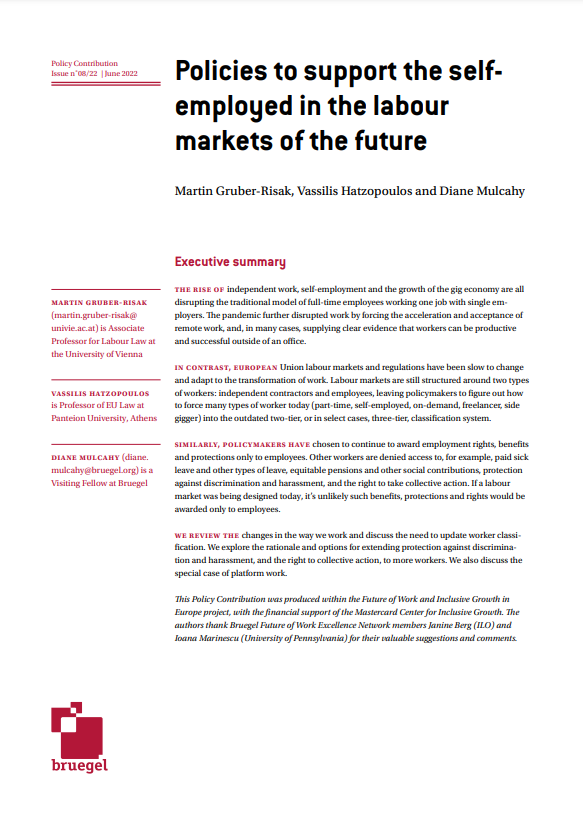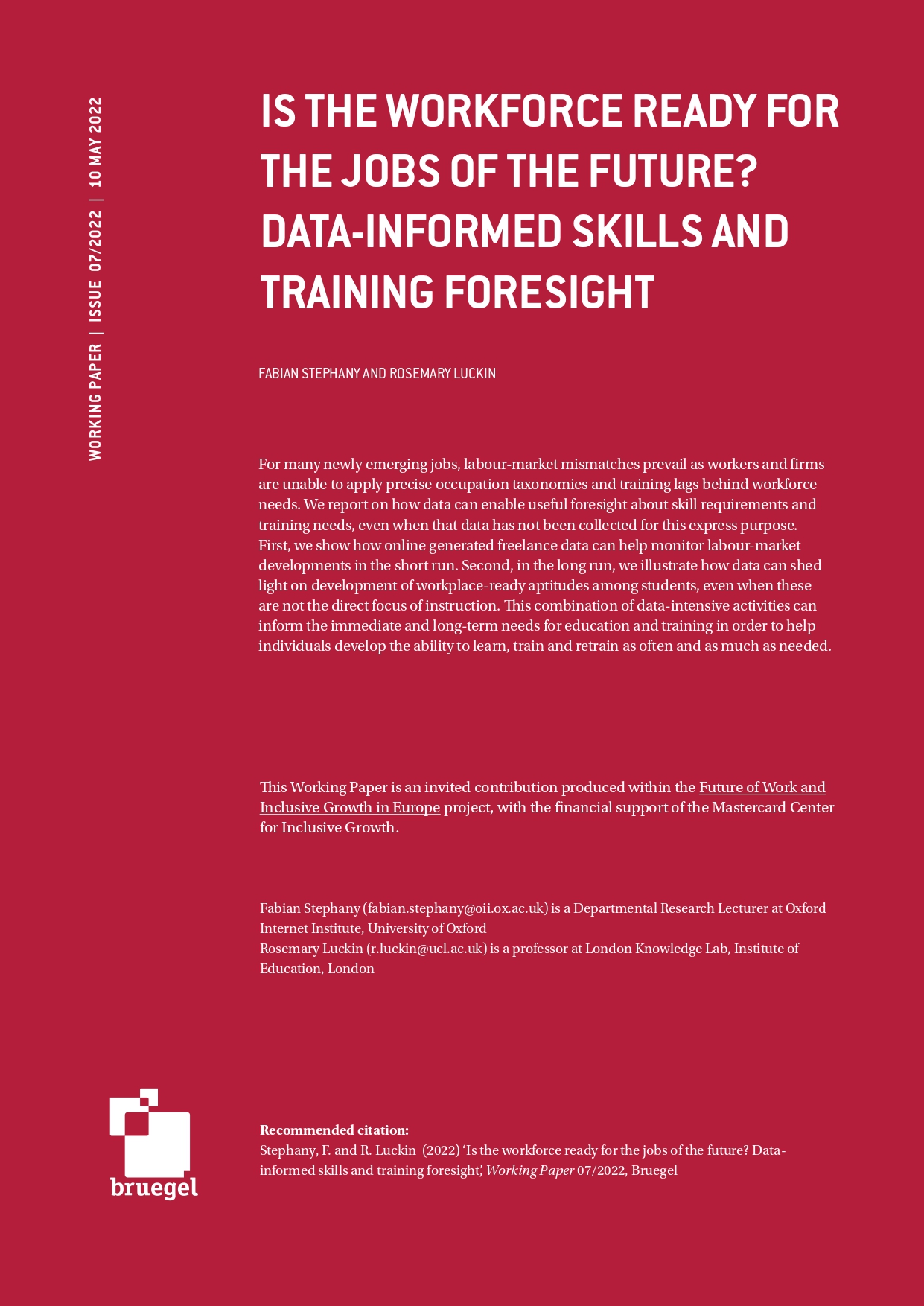Blog Post
An inclusive European Union must boost gig workers’ rights
A European initiative strengthening rights for gig workers is welcome. A digitised economy should also be inclusive.
Approximately 24 million people in the European Union are estimated to have provided platform services (as of 2018; the market has high growth prospects). Most of them provide low-skilled, on-location services. They tend to be young and many have an immigrant background. Platform workers are in a regulatory vacuum: platforms may exert a level of control over them comparable to that exerted by traditional employers. Yet, platform workers lack the social protection and safety nets that are basic rights for employed workers.
Platform workers have arguably proved themselves essential during the pandemic, for example by complementing public transport services or delivering goods to locked-down households. But despite this, their income fell: the pandemic led many more workers to seek a new source of earnings in the platform economy, dramatically increasing competitive pressure on platform workers.
An initiative from the European Commission in this area is thus welcome, and should prompt EU countries to better protect platform workers’ minimum rights. The Commission’s plan is expected to include binding measures (probably through a directive) to establish a presumption that, under certain conditions, platform workers should be considered employees (platforms would be able to challenge the presumption). Safeguards against ‘algorithmic manipulation’, or the use of artificial intelligence to monitor and control workers, would also be introduced.
The Commission is venturing where others have failed. In California, platforms lobbied successfully against a state law that would have forced them to hire their workers. In Europe, platforms seem to have been using the same playbook and are reported to be lobbying EU institutions heavily. Yet, if the European Commission proposes that platform workers are employees and the EU Council and Parliament stick by the proposal, the outcome will be just the opposite: platforms will have failed.
The Commission plan will address three necessities: (a) the compelling urgency to increase protection for platform workers; (b) keeping platform business viable; and (c) staying within the remit of EU competence without stepping into regulation of EU countries’ labour markets.
Plenty of evidence justifies (a). Workers often cannot challenge platforms that unilaterally change their working conditions. Platform workers may be unable to anticipate or plan their earnings. They may be required to work extra time to keep their job or ranking. They may be exposed to automated supervision and algorithmic manipulation. They often have no social insurance or right to sick leave.
Challenge (b) is the platforms’ counter-argument to (a): regulating the relationship with their workers would affect their business models, putting thousands of jobs at risk. Delivery Platforms Europe (on behalf of Bolt, Deliveroo, Delivery Hero, Uber and Wolt) funded a study estimating that up to 250,000 couriers in Europe could be displaced, if the flexible work model had to be abandoned.
Yet, these arguments seem overstated. The Delivery Platforms Europe study suffers from two fallacies: first, it is speculative. Many platform workers, responding to a survey in the study, said they would not like restrictions on their working hours, since they value flexibility. But the Commission’s initiative in itself does not mandate a reduction of flexibility. It simply concludes that the platform-worker relationship is often already structured enough to be formally recognised as a relationship between an employer and an employee. In other words: platforms would not be required to change their business models, but rather to provide the benefits and protection employees are entitled to.
The second fallacy is that this perspective overlooks the possibility that new business models will emerge, which are equally viable and efficient while protecting workers’ rights. Swedish platform Yepstr, for example, employs all its 5,500 workers under fixed-term contracts. Others could do the same, or start-ups could develop solutions that are not yet apparent.
But maintaining the viability of platforms’ business models would help address challenge (c): without EU action, platforms face a scattered framework of rules and court decisions, which significantly hamper their ability to scale up within the single market. This tends to penalise new entrants and smaller platforms, entrenching the market positions of incumbent players. Countries may thus see a social and an economic value in action at EU level: protecting workers and improving the functioning of platform markets (on 29 November, Germany, Italy, Spain, Belgium and Portugal encouraged the Commission to “ban fake-self employment on platforms”).
To be sure, EU policymakers have still plenty to do. Regulatory limitations on collective representation should be tackled. Measures meant to avoid algorithmic surveillance or manipulation have significant overlaps with other ongoing legislative processes, such as the Digital Markets Act and the Artificial Intelligence Act. These initiatives will thus need to be adjusted to be compatible and complementary in an organic regulatory framework. Effective enforcement will be challenging, given the complexity and novelty of the tackled issues. Yet, agreeing and implementing the Commission’s plan will be well worth the effort: a digitised economy should also be an inclusive one.
Recommended citation:
Mariniello, M. (2021) ‘An inclusive European Union must boost gig workers’ rights’, Bruegel Blog, 7 December
This blog was produced within the project ‘Future of Work and Inclusive Growth in Europe’, with the financial support of the Mastercard Center for Inclusive Growth.
Republishing and referencing
Bruegel considers itself a public good and takes no institutional standpoint. Anyone is free to republish and/or quote this post without prior consent. Please provide a full reference, clearly stating Bruegel and the relevant author as the source, and include a prominent hyperlink to the original post.







